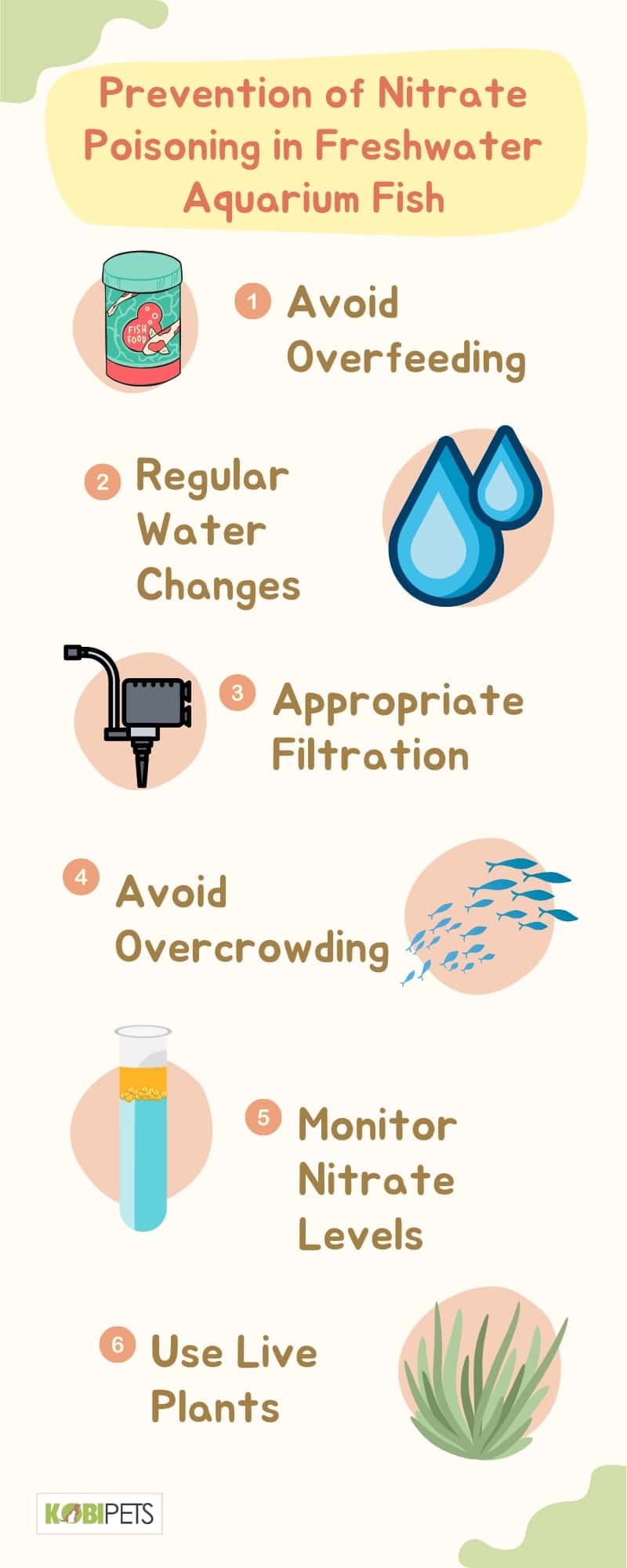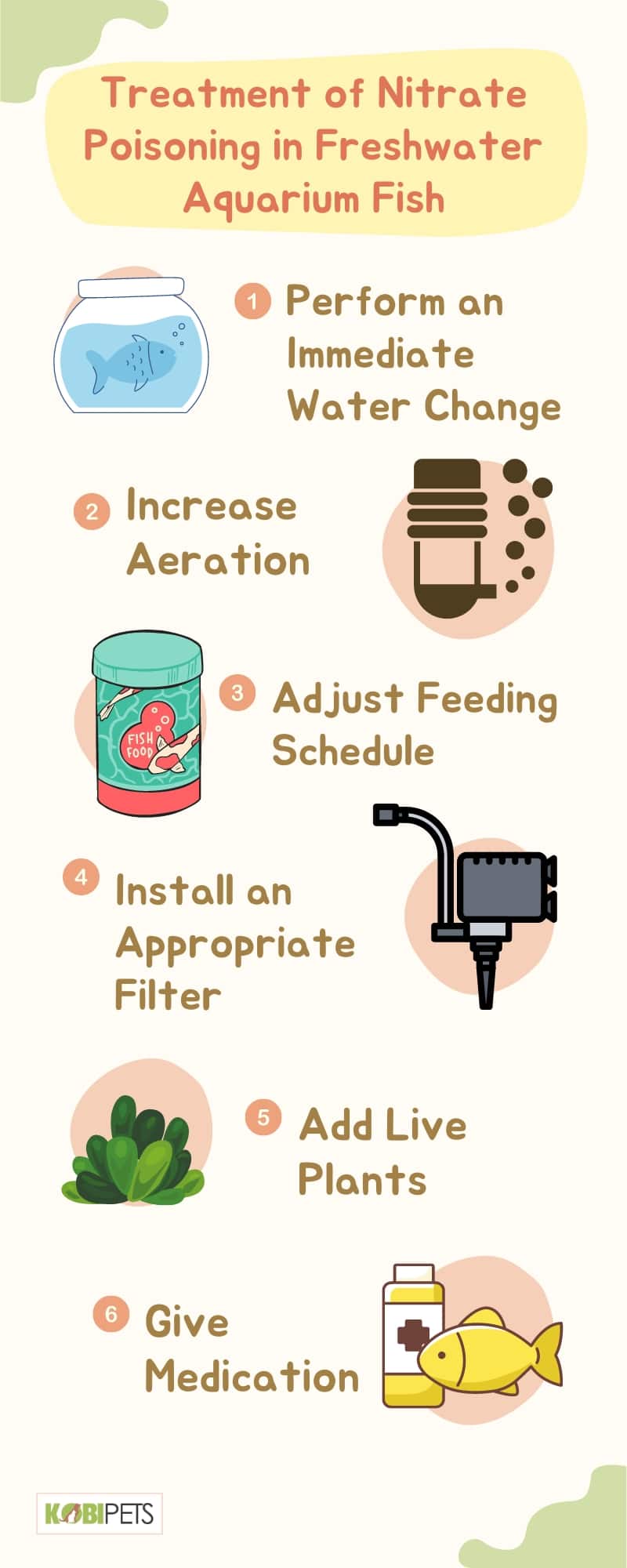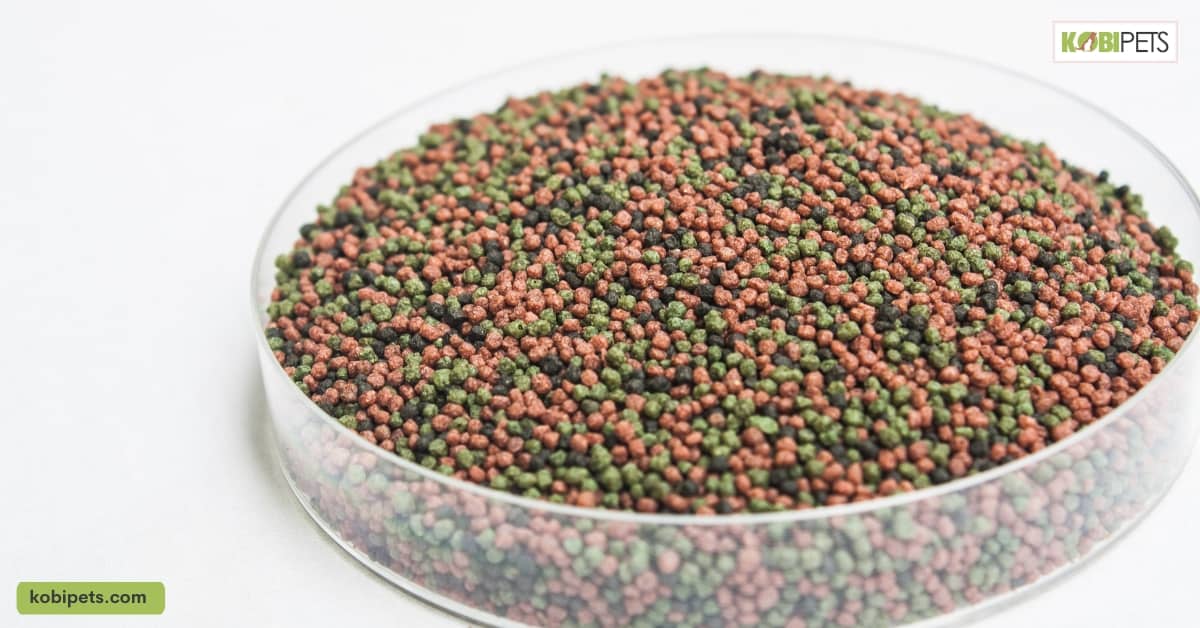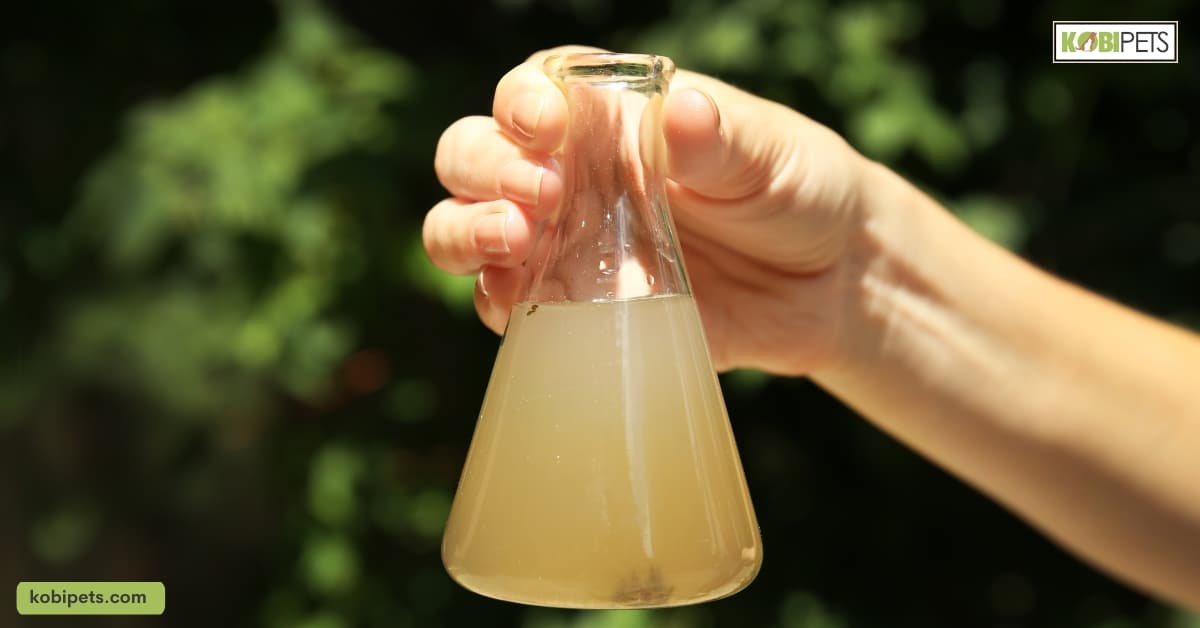Nitrate poisoning is a common and serious problem that can be observed in freshwater aquarium fish. It occurs when the nitrate levels in the aquarium exceed safe levels, which can cause harm to the fish by negatively affecting their health and well-being. This issue often arises due to poor maintenance and neglect of regular water changes and tank cleaning.
Nitrate poisoning is a common issue in freshwater aquariums caused by overfeeding, poor water quality management, and overcrowding. Symptoms include lethargy, difficulty breathing, and convulsions. Prevention involves avoiding overfeeding and regular water changes, while treatment includes water changes, aeration, and medication.
What Is Nitrate Poisoning in Freshwater Aquarium Fish?
Nitrate poisoning is a common problem in freshwater aquariums. Nitrate is a byproduct of the biological filtration process that converts toxic ammonia into less harmful nitrite and ultimately to nitrate. While nitrate is less toxic than ammonia or nitrite, high levels of nitrate can cause health problems for fish.
The symptoms of nitrate poisoning in fish include lethargy, loss of appetite, and difficulty breathing. In severe cases, fish may experience convulsions or even die. Nitrate poisoning can also affect the growth and reproduction of fish.
One of the main causes of nitrate poisoning in freshwater aquariums is overfeeding. When uneaten food decomposes, it produces ammonia, which is then converted to nitrate. Another common cause is poor water quality management, such as infrequent water changes or inadequate filtration.
Causes of Nitrate Poisoning in Freshwater Aquarium Fish
Nitrate poisoning is a common issue faced by freshwater aquarium fish enthusiasts. Nitrate is present in every aquarium and it can be harmful to fish if it accumulates to high levels. Here are the causes of nitrate poisoning. Here are the causes of nitrate poisoning.
1. Overfeeding
One of the most common causes of nitrate poisoning in aquarium fish is overfeeding. When excess food is added to the aquarium, it decomposes and produces ammonia, which is then converted into nitrate. The more you feed your fish, the more waste they produce. This can quickly lead to a buildup of nitrate in the aquarium, which can be harmful to your fish.
2. Poor Water Quality Management
Another cause of nitrate poisoning is poor water quality management. Infrequent water changes or inadequate filtration can lead to a buildup of nitrate in the aquarium. Nitrate levels should be tested regularly with a test kit and water changes should be performed as necessary to remove accumulated nitrates.
3. Overcrowding
Overcrowding in an aquarium can also contribute to nitrate poisoning. Too many fish in a small aquarium can produce excess waste, leading to a buildup of nitrate. It is important to ensure that your aquarium is appropriately sized for the number of fish you have.
4. Lack of Biological Filtration
Biological filtration is critical in removing toxic ammonia and nitrite from the aquarium. Without enough biological filtration, nitrate levels can quickly rise to dangerous levels. Ensure that your aquarium has adequate biological filtration to sustain the nitrogen cycle.
5. High Nitrate Levels in Tap Water
Tap water often contains nitrate, especially in areas with agricultural activities. High levels of nitrate in tap water can lead to high nitrate levels in the aquarium. It is important to test the nitrate levels in tap water before using it in your aquarium and to take appropriate steps such as using a water conditioner or filtration system if necessary.
Symptoms of Nitrate Poisoning in Freshwater Aquarium Fish
Nitrate poisoning can have serious health implications for freshwater aquarium fish. Fish owners need to be aware of the symptoms exhibited by fish suffering from nitrate poisoning. Here are the symptoms of nitrate poisoning.
1. Lethargy
One of the first symptoms of nitrate poisoning in fish is lethargy. Fish may appear sluggish and inactive, spending more time resting at the bottom of the aquarium. This can be accompanied by a loss of appetite.
2. Difficulty Breathing
As nitrate levels continue to rise in the aquarium, fish may begin to exhibit difficulty breathing. They may spend more time gasping for air at the surface of the water or may exhibit rapid gill movement.
3. Abnormal Swimming Behavior
Fish suffering from nitrate poisoning may also exhibit abnormal swimming behavior. They may swim erratically or appear disoriented. Some fish may even swim upside down or in circles.
4. Convulsions
In severe cases of nitrate poisoning, fish may exhibit convulsions or seizures. This is a sign of extreme distress and requires immediate action.
5. Death
If left untreated, nitrate poisoning can ultimately lead to death in fish. Fish that die from nitrate poisoning may appear bloated and have reddish or brown gills.
Prevention of Nitrate Poisoning in Freshwater Aquarium Fish
When it comes to keeping freshwater aquarium fish healthy, one of the most significant threats is nitrate poisoning. This condition occurs when the level of nitrate in the water becomes too high, leading to a range of symptoms that can ultimately be fatal for your fish. The following are the prevention of nitrate poisoning in freshwater aquarium fish.

Prevention of Nitrate Poisoning in Freshwater Aquarium Fish
- Avoid Overfeeding: Overfeeding is one of the leading causes of nitrate poisoning in aquarium fish. Only feed your fish what they can consume in 2-3 minutes. Any leftover food should be removed from the aquarium promptly.
- Regular Water Changes: Conducting regular water changes helps to remove accumulated nitrates from the aquarium. Aim to conduct a 25% water change every week or two to maintain good water quality.
- Appropriate Filtration: A good filtration system plays a crucial role in removing toxic substances such as ammonia and nitrite from the aquarium. Ensure that your aquarium is equipped with a suitable biological filter that can handle the nitrogen cycle.
- Avoid Overcrowding: Overcrowding can lead to excess waste production, which increases nitrate levels. Keep your aquarium appropriately sized for the number of fish you have to avoid overcrowding.
- Monitor Nitrate Levels: Test the nitrate levels in your aquarium regularly using a test kit. If the nitrate levels exceed 40 ppm, immediate action should be taken to address the root cause of the problem.
- Use Live Plants: Live plants can help to absorb nitrates from the aquarium, mitigating the risk of nitrate poisoning. Ensure that the plants are healthy and free from pests before adding them to your aquarium.
Treatment of Nitrate Poisoning in Freshwater Aquarium Fish
Treatment of nitrate poisoning in freshwater aquarium fish requires swift action. If left untreated, nitrate poisoning can lead to the death of your fish. The following are some steps that can be taken to treat nitrate poisoning in freshwater aquariums:

Treatment of Nitrate Poisoning in Freshwater Aquarium Fish
- Perform an Immediate Water Change: Performing a water change is one of the most effective ways to reduce nitrate levels in an aquarium. Aim to do a 50% water change, using dechlorinated water if possible. Water changes should be done frequently to keep nitrate levels low.
- Increase Aeration: Increasing oxygen levels in the aquarium can help alleviate some of the symptoms of nitrate poisoning in fish. Place a good-quality air pump in the aquarium to increase aeration.
- Adjust Feeding Schedule: Overfeeding is one of the main causes of nitrate poisoning, so reducing food intake can help to prevent and treat nitrate poisoning. Feed your fish smaller portions at regular intervals, rather than large amounts once or twice daily.
- Install an Appropriate Filter: The use of a suitable biological filter is essential in removing toxic ammonia and nitrite from the aquarium. Choose a filter that is designed for your tank size, with enough capacity to handle the nitrogen cycle.
- Add Live Plants: Adding live plants can help to absorb toxic substances such as nitrate from the aquarium. Ensure that the plants are healthy and free from pests before adding them to your aquarium.
- Give Medication: If nitrate poisoning is severe, medication may be necessary to treat it. Ask your veterinarian for advice on what medications are suitable for your fish species.
In conclusion
Nitrate poisoning is an issue that freshwater aquarium fish owners need to be aware of. As the level of nitrate in the water increases, the likelihood of fish illnesses and deaths also increases. It is crucial to regularly test and monitor the water levels for nitrate and take the necessary steps to reduce them, such as performing water changes and properly maintaining the filtration system.













